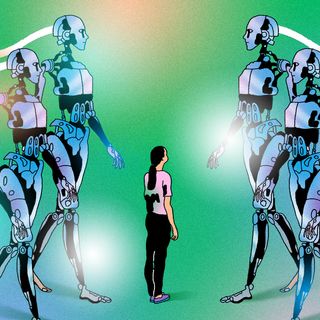
How Climate Change Disrupts Romance, Sex
The psychological toll of climate change can manifest in heightened stress and anxiety — impacting one’s capacity to be intimate.

“At night, my boyfriend and I usually cuddle for a bit before we go to sleep. This time [during the U.K.’s record-breaking heatwave] when he put his hand on me, I was like: ‘get the f*ck off,'” a 25-year-old told Dazed Digital, adding, “I didn’t feel sexual at all… I think I was just getting in my head about how hot it was going to get, freaking out about how much [water] I should drink, and trying not to exert myself.”
This isn’t an isolated experience. Past research has already documented how rising temperatures attributed to global warming is bringing down birth rates. Indeed, when a leather sofa that might have seemed sexy to get it on during intimate movie nights earlier, is reduced to a sticky puddle of sweat in the summer, it feels far from sexy. A partner’s touch that can warm one up during a chilly evening, can feel repulsive when one is drenched in sweat, praying for the mildest respite from the heat.
“When a person is exposed to extreme temperatures, their body can experience physiological changes, such as increased sweating, feelings of fatigue, dehydration and general malaise. These factors can affect the comfort level and the willingness to engage in sexual activities,” explains Andrés Suro, a sexologist. “Additionally, extreme heat can disrupt sleep and rest, which can impact the energy levels and the ability to experience sexual arousal. Being in a hot and suffocating environment can also be discouraging, making it difficult to concentrate and enjoy the intimate moment.”
But the aversion to sex in hot climates isn’t just psychological; intense heat permeates deeper, impacting our sex lives biologically, too. “Extreme heat can cause increased sweating and fluid loss, which can lead to dehydration, which can affect the body’s hormonal balance and have a negative impact on libido. In addition, high temperatures can increase the levels of stress and trigger a higher production of cortisol, a hormone that can interfere with the sexual response,” Suro adds.
Rising temperatures have been linked to a marked increase in sleeplessness as well. Meanwhile, sleep deprivation has long been associated with a drop in, both, sexual desire and arousal in women.
Related on The Swaddle:
Why Orgasming Before Bed Can Help People Fall Asleep Faster, Deeper
To make matters worse, global warming disrupts the body’s hormones, too — further reducing one’s sex drive. “Hotter temperatures cause your body to produce less testosterone, the hormone responsible for libido and performance… This can lead to lower sex drive, reduced arousal, and problems with erections [and] ejaculation. The impact may be subtle at first, but over weeks and months of prolonged heat, the effects add up,” writes Saransh Jain, a sexologist. “When it’s hot out, your body shifts its focus to cooling itself, reducing energy for reproduction.”
Further, by amplifying the frequency and intensity of extreme weather events — like cyclones, droughts, wildfires, and floods — climate change can, reportedly, cause many to experience symptoms akin to those induced by anxiety, depression, and even PTSD. The Intergovernmental Panel on Climate Change’s Sixth Assessment Report had noted, “Increases in heat extremes that are related to climate change pose diverse risks to mental health globally, ranging from altered affective states to increased mental health-related hospital admissions and suicidality.” Mental instability, thus triggered, can impact the intimacy otherwise shared by a couple. This doesn’t just impact their sex life, though; the heat can make romance, too, evaporate.
Particularly so, since heatwaves also make people irritable and angry; beyond the instinctive exasperation, people feel at the heat and humidity, heatwaves may also be linked to social volatility. A 2013 study found evidence of increasing temperatures leading to a rise in violence among people. Another report, published almost a decade after, found that rising temperatures in India, Nepal, and Pakistan had caused domestic violence to shoot up in the countries.
The psychological toll that climate change takes can also manifest in heightened stress and anxiety — negatively impacting one’s capacity to engage in romantic relationships. The uncertainty that extreme weather events can usher, also exacerbates mental health concerns, hindering our ability to sustain — let alone to form — intimate connections. Further, by curbing outdoor recreational activities, global warming also limits opportunities for the kind of chance encounters and shared experiences that could, potentially, foster romantic connections.
Related on The Swaddle:
How Lack of Sleep Makes People Less Helpful, More Lonely
Displacement, another known consequence of climate change, is also driving couples apart. “I asked a man to marry me once… For three years, we [lived] in the eastern Sierra Nevada. I was as enchanted by our mountain home as I was by him,” Astra Lincoln, a journalist focusing on the environment, wrote in Los Angeles Times this February. Soon, however, wildfires became a common occurrence in her town, prompting her to persuade her partner to migrate away, get married, and build their lives elsewhere. “[W]e finished two bottles of Grüner Veltliner, maps unfolded around us, pointing out new places we could go. By the next morning, he had changed his mind. He asked me to leave without him — to leave him,” she reminisces, adding, “It would be hard for him to leave our tiny town. He was an immigrant; his status was tied to his work.”
Just like Lincoln’s partner, migrating isn’t a luxury everyone can afford. Meanwhile, reports suggest that of the almost 60 million people displaced, gobally, in 2021, a vast majority were forced to do so due to climate-related events. With extreme weather weather events triggered by climate change becoming commoner by the year, perhaps, fates similar to Lincoln and her ex await more couples.
With climate change disrupting people’s routines and lifestyles, too, relationships are threatened. Besides forced migration, the destruction of homes and disruptions in daily life, uproot people from their familiar environments, causing emotional strain and challenges to maintaining intimacy. And so, another gloomy possibility is this: “[A]s people are forced to move to somewhere habitable due to rising sea levels… lack of resources will cause a physical distance between couples, which can also lead to a decline in sexual satisfaction and connection.”
Climate change is, clearly, changing more than just the weather. The question, now, is whether love stands a chance against it.
Devrupa Rakshit is an Associate Editor at The Swaddle. She is a lawyer by education, a poet by accident, a painter by shaukh, and autistic by birth. You can find her on Instagram @devruparakshit.
Related


Inadequate Mental Healthcare Has Given Rise to AI Therapy – What’s the Harm?
